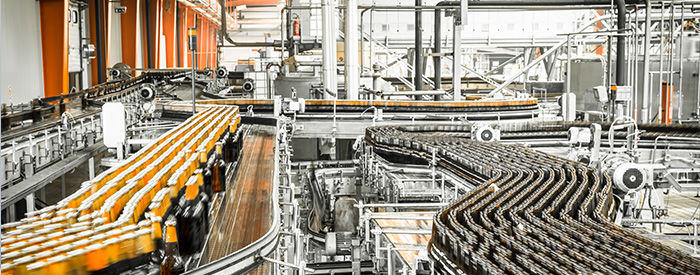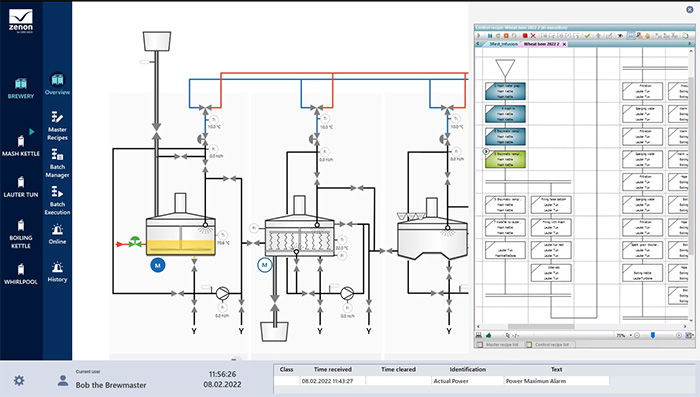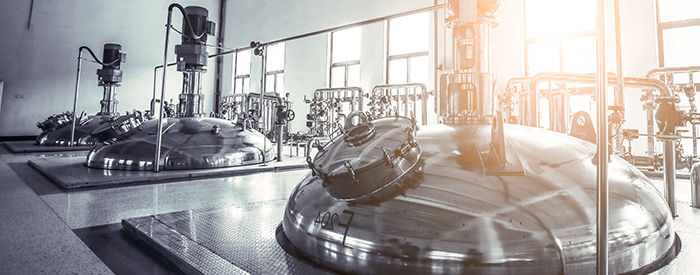How digital technology can transform food and beverage manufacturing plants

The food and beverage industry is swiftly evolving with the integration of the new technologies of Industry 4.0. Digital advancements offer both opportunities and challenges for manufacturers.
Importantly, digitalization isn't an end goal; it's a strategic tool to help companies achieve their objectives. Our industry's changing landscape highlights that technology isn't just about progress; it must also be a means to drive sustainability in businesses. Welcome to the future of food and beverage, where innovation meets sustainability.
Technologies like Internet of Things (IoT), advanced data analytics, the cloud, and smart sensors have the potential to sustainably transform food and beverage manufacturing plants. They offer benefits such as enhanced product quality, reduced energy consumption and optimized processes. Increasingly, using them is crucial to staying competitive and meeting consumers’ continually evolving preferences.
Why food and beverage manufacturers need to consider digital technology
The food and beverage industry is undergoing a digital transformation. From large corporations to smaller, more agile brands, growing numbers of companies in the industry are using technologies to gather more data about their facilities. They use that information to transform the manufacturing environment and redefine how their workforce, processes and assets operate in the new environment.
At the core of the digital revolution is data. Manufacturers can use smart sensors to collect real-time data about how their equipment is operating, how much energy they’re using and more.
These smart sensors automatically send this data to a IT system that analyzes the data using analytics techniques and combines it with historical data. These analyses provide valuable insights about how to improve operations, from the overall equipment effectiveness (OEE) to energy data management.
All this information can be uploaded to the cloud so that it can be accessed from anywhere and more easily used to make improvements.
You can use software such as zenon to manage all of these aspects of food and beverage manufacturing. zenon, a standardized software platform for industrial automation onto which you can add features and modules as needed, encompasses HMI, SCADA, soft PLCs, Alarming, Messaging, Reporting and more.
Not exploiting the potential of this data could mean leaving cost savings and other improvements on the table. Plus, as more companies start using these technologies, it becomes essential to use them as well to avoid falling behind.
The importance of digital technology in the food and beverage industry extends to all parts of the production process.
- Equipment supply and integration: Digital technology that can integrate the various kinds of equipment and systems in a manufacturing facility helps create a more cohesive operation. It is also able to improve overall equipment effectiveness, reduce downtime and improve asset utilization.
- Processing in the food and beverage industry: The right software also helps to optimize food processing operations. With the help of digital technology, manufacturers can increase productivity and efficiency, massively reduce energy use and improve product quality.
- Filling and packaging: Besides using data to uncover potential enhancements in their filling and packaging processes, manufacturers can combine packaging and production lines to manage their plants much more efficiently. Automation can be introduced to reduce costs and increase efficiency. Using the right software with great connectivity, allows you to quickly scale these solutions across the facility.

Subscribe to our newsletter

about F&B and COPA-DATA
The benefits of using technology in the food and beverage industry
Digital technology redefines food and beverage manufacturing in many different ways. Here are a few of the benefits it can provide for you:
1. Enhanced food and beverage quality
In the food and beverage industry, products must meet high-quality standards and regulations to be suitable for consumers. Food and beverage manufacturers need to control their processes strictly. Digital technology can also assist with quality assurance and even with making improvements to enhance the quality of food and beverage products overall.
Data is crucial to quality assurance. With digital technology, you can track all kinds of data related to your production process. This allows you to detect variations in the process that could lead to quality issues in real-time. This enables you to quickly correct these issues, potentially saving you significant amounts of time and money. That is especially important in batch production, in which products are made in groups rather than one by one.
If an error does occur, you can use the data you collected during the production process to determine why. Advanced solutions can also allow you to record and play-back your processes visually to troubleshoot any error quickly and more precisely. This can help you to prevent the issue from happening again in the future.
You can furthermore use your data as well as data analytics technology to find ways to improve the quality of your products and maintain the precise process control needed to meet quality standards. Analyzing historical data may reveal patterns related to what leads to higher quality products, enabling you to make adjustments to your production processes quickly and even remotely.
zenon, helps you to collect quality-related data and to control your processes precisely. zenon’s Batch Control and Recipe Group Manager tools support you in creating, managing and executing recipes, control processes, and analyzing production. zenon makes batch reports available immediately following production, which helps make the quality assurance process more efficient. zenon’s ability to easily integrate with other systems helps companies to more easily oversee and control their processes to improve quality.

2. Optimized production lines
Line management using digital technology supports you gain greater visibility into and control of your production lines, enabling you to make improvements to drive better results. Even if your line consists of various types of machines and devices, you can integrate them and view their data in one system with a solution such as zenon.
This connectivity makes it easier to uncover ways to optimize your lines gradually. It also supports you by quickly identifying changes and issues so you can respond to and correct them.
The data you collect can also inform analyses and reports that present data in a clear way and make it easier to spot potential improvements. As data is collected in real-time, the production team can see information about the current batch, events and alarms throughout the process, helping them to control the process and correct faults.
Production processes create significant amounts of data, which you can even store cloud-based. This storage method allows you to easily combine data from different sources, access data from anywhere and analyze both recent and historical data for various purposes.
You might use this data, for example, for predictive maintenance, which involves tracking equipment performance to determine the ideal time to perform maintenance work and repair. This helps reduce maintenance costs, reduce downtime and increase the productivity of your lines. It can also help with improving overall equipment effectiveness, workflow management, documentation and more.
3. Integrated functions and asset management
Manufacturing food and beverage products can be a complicated process involving many different pieces of equipment, people and tasks. To improve this process, it’s helpful to have as comprehensive a view of it as possible. Digital technology can help enable this comprehensive view by connecting the various systems involved and gathering all of the data in one place.
Digital technology also allows you to control and alter processes without having to go where the relevant pieces of machinery are physically. With a centralized system, you can see all the relevant data from wherever you are and make adjustments remotely.
This integration can also help you to improve asset management and increase your overall equipment effectiveness. Having all of your data available in one place helps you to more easily identify issues that may be reducing effectiveness.
It can also be useful for avoiding errors in production and handling emergencies. The integration of functions such as alarm lists, event lists, camera views, trends and key performance indicator displays allows users to receive real-time, role-based information if an incident occurs. This enables you to respond quickly and effectively, increasing equipment availability and productivity.
With zenon you can easily create your ”cockpit” to control your plant and bring it to optimum performance. Don’t waste your time looking for the right information – instead, spend your time using the right information to improve your processes.
Digital technology can also help you extend machine lifecycles. For example, machine builders can use zenon as a retrofit solution to improve the lifetime of their machines by upgrading them using software. zenon’s backward compatibility with applications enables more flexibility in hardware replacement.
Making upgrades using compatible software, instead of purchasing new replacement machines, can save companies significant amounts of money while still providing them with the benefits of an upgrade.
4. Minimized energy consumption
Reducing the energy consumption of a manufacturing plant reduces costs and also helps to reduce environmental impact. These benefits contribute to sustainability goals and support companies in their Net- Zero transition.
This can lead to increased sales and investment and may also result in more loyalty from both customers and employees.
Tracking energy data may reveal that certain processes or pieces of equipment are disproportionate energy intensive. It can also reveal unexpected spikes in energy use, which typically indicate a problem, such as a malfunctioning piece of machinery.
Tracking and analyzing energy data is a crucial part of creating an energy management system that complies with standards such as ISO 50001.
With digital technology, you can automatically record energy data in real time, increasing the accuracy and efficiency of your data recording. You can also combine this data with historical data. This information can then be used for dashboards, alarm lists and reports.
Consider: what is the relationship between the production data and the actual energy consumption data? How does this compare to other production locations? What trends and forecasts can be predicted based on the current machine data? When you use zenon, you gain knowledge that improves your existing manufacturing process in a sustainable way and sheds light on dark areas thanks to customized reports.
Because of this automatic data collection, you can spend more time on making your facilities more energy-efficient and less time tracking data manually. A digital approach, especially with a versatile platform like zenon, also enables you to more easily combine energy data from across your systems. You can even track the consumption of multiple energy sources, from electricity to gas to compressed air.
5. Increased flexibility in production
Digital technology increases the flexibility with which producers can monitor and control the production process. This supports creativity, allows for more variety in products and can even speed time to market. The capabilities of zenon as a process control system are great and offer lots of opportunities. zenon can be used and integrated easily within many fields in food & beverage processing.
While zenon has use cases for a multitude of food and beverage production purposes, breweries make for an excellent example of this capability in action. With an automation platform that works with various kinds of hardware and integrates easily with existing systems, you have the freedom to use new technologies and try out new ideas. You can try new recipes more quickly and with fewer investments in new equipment. Digital technology also helps you to control custom brewing processes more efficiently, even when brewing in small batches.
With recipe control systems that are based on PLCs, it can be difficult to launch new recipes. zenon, however, is based on the ISA-88 standard for batch process control. This setup enables you to use equipment flexibly and produce multiple types of beer on one system. Brewers can, therefore, try new recipes without needing to reprogram equipment.
This flexibility enables breweries to efficiently update their processes and products to keep up with changes in the market. In addition to new products, zenon lets you introduce new maintenance concepts, production processes and functionalities. Many of the needed functionalities are available out-of-the-box, making for easier and faster implementation.That simplifies the management and maintenance of the software, reducing the training and IT support burden because there is just one platform to manage.
The true value of zenon comes when looking at its universal abilities that translate to the food and beverage industry at large. Being able to monitor and control your inventory and the production process with greater flexibility enables you to produce a wider variety of products and more quickly and cost-effectively try out new ideas.
In this way, zenon is an enabler for sustainable decision making.
With zenon you have a single software platform that can manage all these use cases and deliver all these benefits.

zenon — a software platform that enhances food and beverage production
The food and beverage manufacturing industry is going through a digital transformation in which software plays a significant role. New technologies offer numerous benefits to food and beverage companies but are also changing the expectations of the industry and what’s needed to succeed.
Having the right technology in place is crucial to making the most of the digital revolution. zenon from COPA-DATA is the comprehensive software for shaping sustainable business through innovation and digitalization for food and beverage manufacturers.
zenon helps you to reduce your energy consumption, enhance product quality, optimize your production lines, integrate systems and increase the flexibility in your production processes. You can use it in nearly every stage of your production process and larger operations, from production to packaging to energy management. It also allows you to implement automation, Industrial Internet of Things (IIoT) and other Industry 4.0 solutions.
Smooth processes, empowered employees, and robust communication between various OT / IT systems require mature networking technologies, as zenon offers. Valuable process control functions and any production-relevant information are made securely available to people and digital systems installed on-premise or in the cloud.
In order to exploit the benefits of the Smart Factory, flexible systems that communicate openly with one another are required. Be it horizontally between the machines at production level or from the sensor to the cloud, manufacturer-independent connectivity to the networks of heterogeneous production landscapes is decisive for success.
The zenon software platform is designed to be easy to use and integrate with existing equipment and systems. It combines data recording, equipment operation and business intelligence into one environment and handles data from across your operations. This helps you to make the most of your information. It’s flexible, scalable and highly secure – helping you to meet the ever-changing needs of today’s businesses.
zenon stands out in the digitalization landscape, offering distinct advantages in integration, maintenance, agile improvements, and solution lifecycle management.
Integration Excellence: zenon excels in seamlessly integrating with existing systems. This facilitates a cohesive digitalization journey, minimizing disruptions and maximizing efficiency.
Efficient Maintenance: With zenon, maintenance becomes more efficient and manageable. The platform is designed to simplify upkeep tasks, reducing downtime and enhancing overall system reliability. This is crucial for sustaining operations without compromising productivity.
Agile Improvements: zenon's agile framework allows for swift and adaptive enhancements. It enables organizations to respond rapidly to evolving technological needs, ensuring that the software remains up to date and aligned with the dynamic requirements of the digital landscape.
Robust Solution Lifecycle Management: From inception to evolution, the zenon software platform includes comprehensive tools for monitoring, updating, and optimizing digital solutions, thereby extending their longevity and relevance.
Incorporating zenon into your digitalization journey ensures not only a smooth integration but also efficient maintenance, agile adaptability, and robust management throughout the solution's lifecycle. It's a powerful ally in navigating the complexities of the digital era.
Contact COPA-DATA today to learn more
zenon helps you make the most of the digital revolution and reach your operational and return on capital goals. With a robust and flexible set of capabilities from data acquisition, analysis and reporting to automation, zenon Software Platform is a valuable tool for any food and beverage manufacturer.
To learn more, contact us today.














































